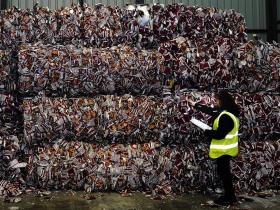Costa Coffee has pledged to recycle as many disposable cups as it produces by 2020, raising the bar for action on disposable cup recycling in the UK.
Now the company has been joined by campaigners in calling for other major coffee chains to follow suit.
The action taken by the company involves paying waste management companies an additional £75 per tonne of waste, making it economically viable for them to take coffee cups to the specialist facilities that can recycle them.
- Read more
Costa's recycling commitment is a vindication of our campaign
“We’re hoping that via this announcement our other competitors will come on board with us as well – we can’t see why they wouldn’t,” said Costa managing director Dominic Paul upon the launch of the new scheme.
Asked by The Independent if they were planning to make similar recycling commitments, however, other coffee giants could not match the decisive action taken by Costa earlier this week.
SumOfUs, which has been heading up a campaign demanding Starbucks delivers a comprehensive plan for cutting its plastic pollution, said the silence from the American coffee giant “is now deafening”.
“Costa’s welcome move shows the coffee giants who built and profited from our throwaway culture have a responsibility to fix the problems they’ve created,” said Sondhya Gupta, senior campaigner at SumOfUs.
Latte levy: The plastic problem inside your coffee cup
Following a petition with over one million signatures, Starbucks committed money to a project with a “three-year ambition” to create a fully recyclable cup.
“In March, we announced a $10m (£7m) partnership with Closed Loop Partners and its Center for the Circular Economy to establish a groundbreaking consortium to launch the NextGen Cup Challenge," a spokesperson told The Independent.
“Through the NextGen Cup Challenge, the consortium will award accelerator grants to entrepreneurs working on ideas that could lead to the development of more sustainable cup solutions and, invite industry participation and partnership on the way to identifying a global solution.”
- Read more
Costa Coffee pledges to recycle half a billion disposable cups a year
While the action taken by Starbucks was welcomed by a coalition of environmental organisations, industry experts have pointed out that the capacity already exists in the UK to recycle coffee cups – the issue is providing the infrastructure to get them there.
When approached by The Independent, Laura Gutowski, strategy and innovation director at Pret A Manger said “Packaging plays a big role at Pret and we know we have lots of work to do to reduce the impact it has on the environment”.
“In 2017 we trialled collecting paper cups in some shops in London and Manchester. We learnt a great deal from this trial – such as how do we encourage more customers to participate – and we’re working through those learnings so that we can launch new trials this year.”
Plastic waste across the world: in pictures
Plastic waste across the world: in pictures
-
1/15
A father and son on a makeshift boat made from styrofoam paddle through a garbage filled river as they collect plastic bottles that they can sell in junkshops in Manila. The father and son team earn some three US dollars a day retrieving recyclables from the river.
AFP/Getty
-
2/15
A composite image of items found on the shore of the Thames Estuary in Rainham, Kent. Tons of plastic and other waste lines areas along the Thames Estuary shoreline, an important feeding ground for wading birds and other marine wildlife.
Getty Images
-
3/15
Children collect plastic water bottles among the garbage washed ashore at the Manila Bay. According to the United Nations Environment Programme, at current rates of pollution, there will likely be more plastic in the sea than fish by 2050.
AFP/Getty
-
4/15
Plastics and other detritus line the shore of the Thames Estuary. In December 2017 Britain joined the other 193 UN countries and signed up to a resolution to help eliminate marine litter and microplastics in the sea. It is estimated that about eight million metric tons of plastic find their way into the world's oceans every year. Once in the Ocean plastic can take hundreds of years to degrade, all the while breaking down into smaller and smaller 'microplastics,' which can be consumed by marine animals, and find their way into the human food chain.
Getty
-
5/15
A dump site in Manila in 2013. The Philippines financial capital banned disposable plastic shopping bags and styrofoam food containers, as part of escalating efforts across the nation's capital to curb rubbish that exacerbates deadly flooding.
AFP/Getty Images
-
6/15
Children swims in the sea full of garbage in North Jakarta, Indonesia.
Getty
-
7/15
An Indian woman holds a jar filled with Yamuna river water polluted with froth and toxic foam to be used for rituals at the river bank in New Delhi, India. The Yamuna River, like all other holy rivers in India, has been massively polluted for decades now. The river that originates in a glacier in the pristine and unpolluted Himalayas, and flows through Haryana, Delhi and Uttar Pradesh before merging with the Ganges River in Allahabad, once used to be the lifeline of the Indian capital. Currently, it is no more than a large, open sewer that is choking with industrial and domestic discharge that includes plastic, flowers and debris and has virtually no aquatic life.
EPA
-
8/15
Plastic waste is washed up on South Troon beach in Scotland. Recent reports by scientists have confirmed, plastics dumped in the world oceans are reaching a dangerous level with micro plastic particles now being found inside filter feeding animals and amongst sand grains on our beaches.
Getty
-
9/15
Children collect plastic to be sold and recycled, in a polluted river in suburban Manila. The city's trash disposal agency traps solid waste floating down waterways that was thrown into the water by residents of slums along riverbanks upstream.
AFP/Getty
-
10/15
View of the Carpayo Beach in La Punta, Callao, some 15 km of Lima. In 2013, the NGO VIDA labeled the Carpayo Beach as the most polluted in the country – 40 tons of trash on each 500m2.
AFP/Getty
-
11/15
Trash from Kamilo Beach in Hawaii.
Gabriella Levine/Flickr
-
12/15
A scavenger collects plastic cups for recycling in a river covered with rubbish near Pluit dam in Jakarta.
Reuters
-
13/15
Rubbish fills Omoa beach in Honduras. Floating masses of garbage offshore from some of the Caribbean's pristine beaches are testimony to a vast and growing problem of plastic pollution heedlessly dumped in our oceans, locals, activists and experts say.
AFP/Getty
-
14/15
A man climbs down to a garbage filled river in Manila. Plastic rubbish will outweigh fish in the oceans by 2050 unless the world takes drastic action to recycle the material, a report warned in 2016.
AFP/Getty
-
15/15
Garbage on East Beach, Henderson Island (Pitcairn Islands), in the south Pacific Ocean. The uninhabited island has been found to have the world's highest density of waste plastic, with more than 3,500 additional pieces of litter washing ashore daily at just one of its beaches.
EPA
Caffe Nero, the other major UK coffee chain, had not responded to The Independent’s request at the time of publication.
Costa Coffee’s announcement follows The Independent’s Cut the Cup Waste campaign, which the company’s managing director Mr Paul acknowledged as highlighting “the importance of finding a solution to this issue”.
- More about:
- Cut The Cup Waste
- disposable coffee cups
- plastic pollution
 Reuse contentRead the Original Article
Reuse contentRead the Original Article































